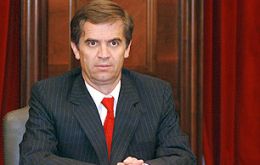MercoPress. South Atlantic News Agency
Tag: Chilean Central Bank
-
Wednesday, December 4th 2019 - 09:50 UTC
Chilean economy contracts 3.4% during October compared to a year ago

Chile's economy contracted 3.4% in October from the same month a year ago, the central bank said, posting the single biggest drop in a decade as weeks of violent protests began sending shockwaves through the Chilean economy.
-
Friday, July 31st 2015 - 05:33 UTC
Dollar in Chilean Pesos climbs to its highest level since December 2008

The US dollar ended Thursday trading in the Chilean money exchange market at its highest since December 2008, that is 674 Pesos for the greenback. Currently and seven years ago the main reason has been the US monetary policy: the sub-prime crash in the US and fears of the debacle expanding to the rest of the world, and now growing chances of the Federal Reserve deciding on a rise of the prime rate.
-
Wednesday, November 19th 2014 - 07:12 UTC
Chile grows 0.8% in Q3, and Central bank leaves basic rate unchanged at 3%

Chile's economy grew 0.8% in the third quarter compared with the same period in 2013, the worst performance in five years, the Central Bank reported Tuesday. The bank also announced that the basic rate will remain unchanged at 3%.
-
Thursday, September 5th 2013 - 01:48 UTC
Chilean economy slowing but still vigorous with growth ranging of 4% to 4.5%

Chile's central bank cut its forecast range for 2013 GDP growth but maintained inflation and domestic demand predictions as the effects of a slowdown hitting copper demand are moderated by consumer spending.
-
Thursday, September 6th 2012 - 03:59 UTC
‘Copper insulated’ Chilean economy outperforming and Peso becoming too strong

The Chilean central bank raised its forecast for economic growth this year to between 4.75% and 5.25% (from 4% to 5%), adding that it expects GDP to expand 4% to 5% in 2013.
-
Thursday, August 23rd 2012 - 06:14 UTC
Chile’s 2013 budget based on 5% growth and copper at 3.06 dollars the pound

Chile is planning a 2013 budget with a tendency growth of 5% and an average long term basic copper price of 3.06 dollars the pound revealed finance minister Felipe Larraín together with Rosanna Costa, head of the Budget Office during a presentation before Congress.
-
Saturday, June 16th 2012 - 05:55 UTC
Chile’s leaves basic rate unchanged at 5%; annual inflation in May, 3.1%

Chile’s central bank kept its benchmark interest rate unchanged at 5% for a fifth consecutive month as inflation in the world’s top copper producer eased and unemployment continued to decline.
-
Friday, May 18th 2012 - 09:24 UTC
Chile leaves basic rate unchanged at 5% for the fourth month running

Chile’s central bank kept its key interest rate unchanged at 5% for a fourth consecutive month as surging domestic demand and deterioration in the global economy leave little scope to change monetary policy.
-
Wednesday, November 9th 2011 - 06:44 UTC
Chilean inflation up in October for the third straight month; GDP expands faster

Consumer price inflation in Chile accelerated for the third straight month in October, data released by the National Institute of Statistics showed Tuesday.
-
Monday, October 17th 2011 - 21:36 UTC
Chile not immune but has “the tools to mitigate possible impacts”

Chile’s central bank and government have monetary and fiscal instruments to respond if growth moderates faster than forecast amid concern over the European debt crisis, bank board member Rodrigo Vergara said.
